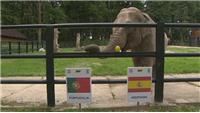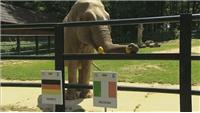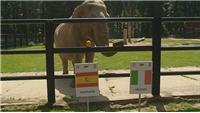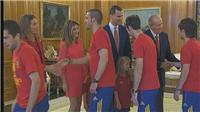
But it was Lev Yashin, from Moscow, who was the team’s heart and soul at the 1960 tournament. I can’t do a better job of describing him than Eduardo Galeano has in Soccer in Sun and Shadow:
When Lev Yashin covered the goal, not a pinhole was left open. This giant with long spidery arms always dressed in black and played with a naked elegance that disdained unnecessary gestures. He liked to stop thundering blasts with a single claw-like hand that trapped and shredded any projectile, while his body remained motionless like a rock. He could deflect the ball with a glance.

It took Yashin’s spidery best to keep Yugoslavia at bay in the final, for Tito’s nation were their biggest competitors both politically and in footballing terms in Eastern Europe. They would reach the Olympic final four times in a row from 1948-1960, finally winning it in Rome a few months after the European Nations’ Cup ended.
And by the 1960 European Nations’ Cup final, the Yugoslavs had already demonstrated their firepower: after brushing aside Bulgaria in the preliminaries, they headed to Belgrade for the second leg of their tie with Portugal 2-1 down. By halftime they had erased the deficit, and they poured in three goals in the second half to set up a semi-final with France.
It what must be one of the most exciting semi-finals ever seen, witnessed by a mere 26,370 in Paris despite the presence of the home team, Yugoslavia prevailed in a titanic battle featuring nine goals scored by seven different players.
France seemed to be on their way to victory when they went 4-2 up in the 53rd minute, thanks to goals from Vincent, Heutte and Wlsnieski (2). Then all hell broke loose between the 75th and 79th minutes: Jerkovic scored twice and Knez once as the Yugoslavs tore apart a shellshocked French team to clinch a 5-4 victory.

The final between the Soviet Union and Yugoslavia could only be something of an anti-climax after that game, despite the political tensions — based off the Tito-Stalin split, though relations had improved somewhat after Nikita Khrushchev took over the Kremlin — bubbling under the surface.
In front of just 17,966 in Paris, Milan Galic opened the scoring for the Yugoslavs just before half-time. The Soviets pulled level in the 49th minute thanks to Torpedo Mosvow’s Slava Metreveli. The winning goal in the first European Nations Cup final came deep into extra time, when SKA Rostov-on-Don’s Viktor Ponedelnik headed home to win the Soviets first and ultimately only major championship.
Hot News
- Funny Balotelli!
- Spanish fans celebrate Euro Cup win
- That's German WAGS!
- The sexy female fans in Euro 2012
- Euro 2012: Spain fans celebrate victory
- Spain vs Italy in clash of the Euro WAGs
- Euro 2012 Final - Spain 4 : 0 Italy, Part 2
- Germany knocked out by Italy
- Natalia Siwiec blasts Sol and the BBC
- Coleen Rooney reveals her bikini body secrets
- Italy's fans celebrated wildly
- Euro 2012 Final - Spain 4 : 0 Italy, Part 1
| Rank | Team | W/D/L | Pts |
|---|
Cities & Stadiums
The Top 3 Teams of Previous Tournaments
| Year | Winners | Runner-up | Third place |
|---|---|---|---|
| 2008 | Spain | Germany | Russia / Turkey |
| 2004 | Greece | Portugal | Netherlands / Czech Republic |
| 2000 | France | Italy | Netherlands / Portugal |
| 1996 | Germany | Czech Republic | France / England |
| 1992 | Denmark | Germany | Netherlands / Sweden |
| 1988 | Netherlands | Soviet Union | Italy / West Germany |
| 1984 | France | Spain | Denmark / Portugal |
| 1980 | West Germany | Belgium | Czechoslovakia |
| 1976 | Czechoslovakia | West Germany | Netherlands |
| 1972 | West Germany | Soviet Union | Belgium |
| 1968 | Italy | Yugoslavia | England |
| 1964 | Spain | Soviet Union | Hungary |
| 1960 | Soviet Union | Yugoslavia | Czechoslovakia |



